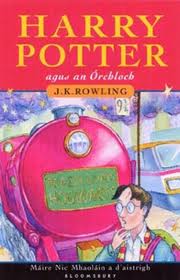Irish Translation Advice
Gaelic Translation or Irish translation as it is referred to most commonly in Ireland has had a rocky and difficult history. The number of native Irish speakers has been in dramatic decline since the middle of the 19th Century. This has made it more difficult to find authoritative sources to provide good English to Irish translation or vice versa.
The excessive influence of English on Irish Gaelic as spoken today is enormous and is known as 'Béarlachas'. Although I am no expert, I know that while many Irish language academics are delighted with the increase in the number of Irish speaking schools (gaelscoileanna), they are concerned with the way some younger people speak the language.
While it is funny, it's also cringey to hear 'O mo Dhia' as a direct English to Irish Translation of 'Oh my God!.' The show Friends has a lot to answer for!
 Gaelic Translation of Harry Potter
Gaelic Translation of Harry Potterphoto courtesy of Jeff Meade
There are lots of other examples (and plenty of my own mistakes as a learner) which I will come back to on another occasion.
This excessive influence of English works its way into many of the worst translations, so be careful who you get to translate to Irish Gaelic or from Irish Gaelic!
The tips below should be useful for people and organizations at home in Ireland and abroad when contracting Irish Gaelic translation work to an accredited Irish Translator, whether it be a short paragraph or a long annual report.
10 Irish Translation Tips
1) Use an accredited Irish translator for the most reliable translation
Until 2005 there was no way of knowing if the translator you were getting to do that English to Irish translation (or vice versa) would do a good job. The introduction of an accreditation system for Irish translators has taken a lot of the worry away. Check out the accredited Irish Gaelic translator list to find one. Many of these may be quite busy, so if you have a small translation job, it may be worth selecting two or three to contact.
2) Ask for a rate for the translation job
Ask the Irish translator for a rate before committing the work. Do they charge by the word or the piece? What do they charge for formatting or editing? Do they base their fee on size of the final translated document, or on the source document? Agree the currency and the rate before they begin the work. You will also need to ask them for a turnaround date and a method of payment. The shorter the turnaround required, the likelihood that the cost will go up. Many of the translators on the Irish Gaelic translator list are free-lancers, so don't expect their systems to be too sophisticated.
3) Find out if your translator is using computer aided translation
Many translators use computer memory software to assist and speed up their translation. This means that if they have done a similar Irish Gaelic translation job for you before, then they should have a lot of the work saved electronically. This should reduce the cost. If you intend giving a lot of Irish translation work to them, then it is worth finding a translator who has suitable software.
4) Ask for references if you feel necessary
If you would feel more reassured, don't be afraid to ask for Irish translation work references.
5) Explain why and who you want the Irish Gaelic translation for
The way the document will be written depends on the audience it is going to be written for. So give a few clear but brief guidelines to the translator to help him.
6) Help the translator with the jargon
If the document is technical or if your organisation has already a glossary of terms in Irish for organisation specific or technical terms, then give this to the translator. It will make his work easier but it will also avoid the situation of him coming back with an alternative translation to the one you or your organisation use.
7) Which dialect do you want the Gaelic translation to be in?
There are 3 key dialects of Irish Gaelic in Ireland; in the North (Uladh), West (Connacht), and South (Mumhan). There is also a standard Irish (caighdeán). All accredited Irish translators should be competent in standard Irish but if you have a preference for one of the other dialects, then you should locate a translator who is comfortable working in a particular dialect.
8) Request a Grammar and Spelling Check
Ask the translator what system he uses to do a spelling and grammar check.
9) Agree on form you want document in
If you want your translation in a specific form of Word or a pdf, then let the translator know.
10) Consider giving credit to Irish translator
If you are going to use the Gaelic translation on a website or in publicity material, tell the translator you will give him the credit on either of these. It tends to up the quality of the work!
Pages related to Irish Translation Tips
Accredited Irish Translator List
Gaelic Matters > Irish Translation
Did you know that Saint Patrick was not an Irish man or the first to bring Christianity to Ireland? Learn a little of the History of St Patrick.

New! Comments
Have your say on Gaelic Matters! Leave me a comment in the box below.